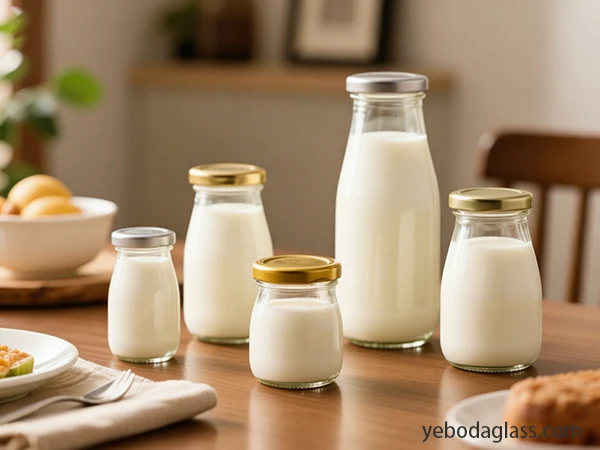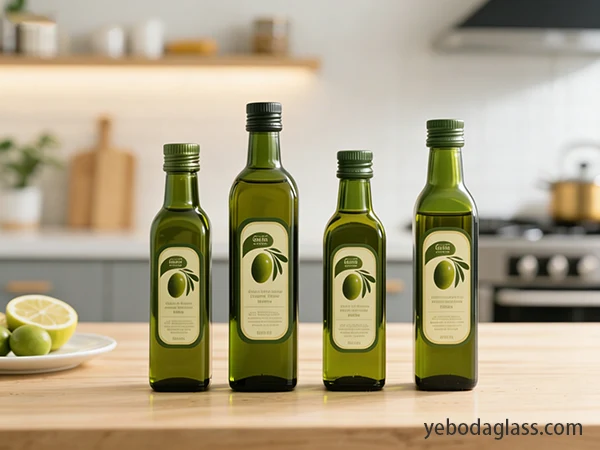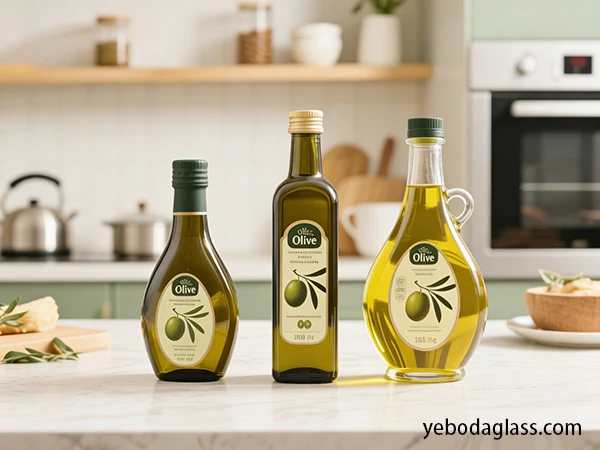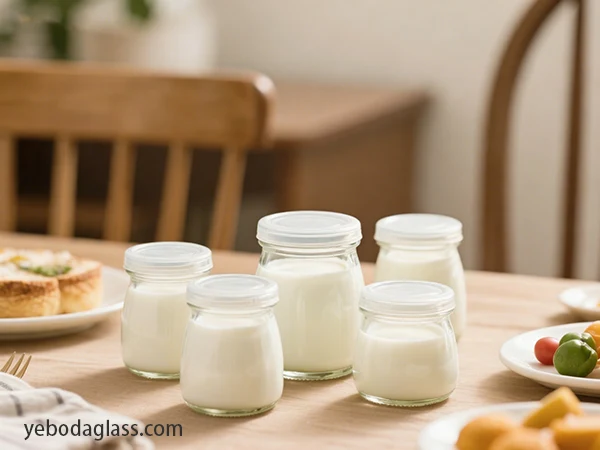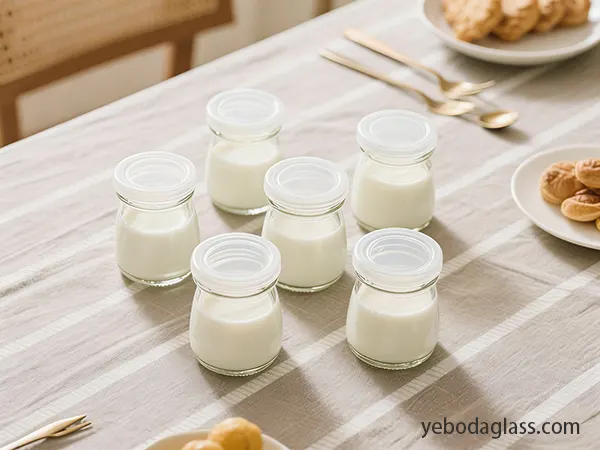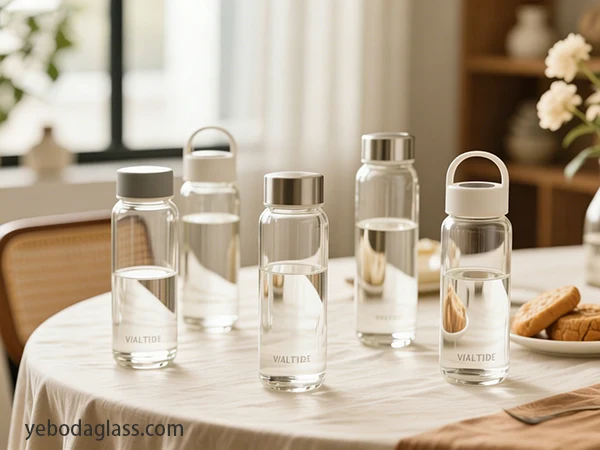Executive Summary
Choosing the best milk bottles bulk are significant move that brands in the dairy, beverage, or specialty liquid industries must make. Your choice of the product will affect not only the appearance and the shelf life of your product but also the efficiency of operations, the costs of logistics, and the environmental impact of your company. When you clearly define your requirements, you make sure that each glass bottle is in line with both your functional needs and your branding goals.
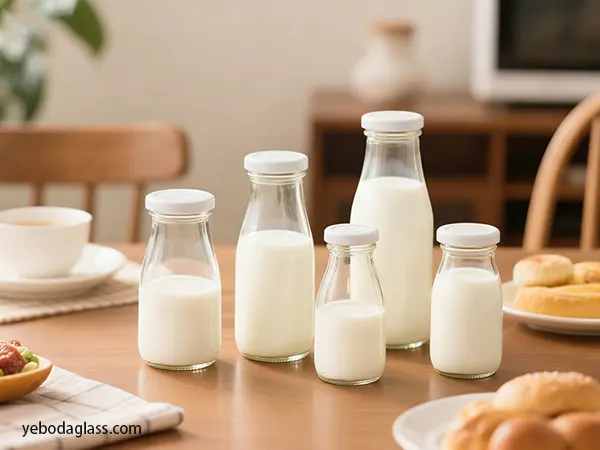
Business Type and Application Context
The different sectors have different expectations of the packaging:
- Dairy Producers: Glass milk bottles are the healthiest and best-presented fresh milk and cream packaging since glass is a non-reactive material and has a nice, traditional look. The glass being transparent is a sign of purity and freshness of the product, and the strong design is capable of pasteurization or cold-chain storage.
- Juice and Beverage Manufacturers: Their bottle choices aim mainly at the protection of the flavor, prevention of the oxidation and attraction of the customers. Using colored or UV-protected glass bottles ensure that the vitamins do not get lost and the freshness is extended, while a nice neck shape makes the product easy to pour.
- Cosmetic and Nutraceutical Brands: These industries are embracing glass milk bottles bulk more and more as a packaging solution for lotions, serums, and supplements to signal purity and give a premium feel.
- Artisanal and Specialty Producers: When it comes to small-batch milk, cold brew, or plant-based drinks, tailored glass milk bottles not only play the role of working packaging but also that of a visual brand communication.
Product Properties and Packaging Requirements
Knowing the liquid characteristics of the product to be packaged, e.g., the viscosity, pH, light sensitivity, and storage temperature, we can easily determine the best bottle material, its thickness, and the type of the closure.
As an example:
Thick liquids like cream or protein shakes probably should be packed in wide-mouth bottles so that consumers can pour them easily. In case the product is a highly acidic juice, it should be packed in materials that are chemically stable, like glass, in order to prevent corrosion. UV-sensitive dairy drinks should be implemented with the likes of an amber or frosted finish that will block the light and keep them safe. Working with milk bottles bulk requires that all of the bottles be of the same shape, and the measurement tolerance should be very strict for the automatic filling and capping machines. Any slight difference is able to stop the production line, hence, it is very important to have high precision of the molds as well as uniformity of the batches.
Essential Design Attributes
A full framework for specification ought to consider:
- Material Compatibility: The main priority is that the liquid and packaging stay free of any interactions.
- Dimensional Consistency: The machine used for capping and the labeling line should be compatible with the size of the bottle.
- Closure Design: Better sealings can be achieved when using traditional crown caps or flip-top and screw designs.
- Ergonomic and Aesthetic Features: The bottles need to be of a convenient handling and their looks should be in line with the brand value.
- Label Surface & Decoration Compatibility: Labeling methods like printing, embossing, or shrink labeling are all suitable for a smooth glass surface.
It is much easier sourcing, less waste is created, and the end-user experience is better when we define these details upfront.
Material Selection and Performance Analysis for Milk Bottles Bulk
The material that is used for milk bottles in bulk is what mainly decides the durability, price, and brand image of a product, as well as its recyclability. Three different materials (glass, PET, and HDPE) all have a bit different advantages and disadvantages.
Glass Bottles: Classic Strength Meets Sustainability
Nothing is changing the position of glass milk bottles as the favorite choice of the industry for high-end and eco-friendly markets. What makes them extremely safe is their origin from three naturally occurring materials: sand, soda ash, and limestone.
Advantages:
- Recycling is done 100% without any quality loss.
- The product is safe from contamination of both air and moisture which is exactly what fresh dairy needs.
- Are able to endure sterilization at very high temperatures.
- Have characteristics of a luxury, transparent packaging which is highly appreciated in the world of branding for upscale markets.
However:
- One of the major problems with them is their being somewhat heavy and that they may easily break, hence the necessity for tight packaging and careful transportation. Nevertheless, solutions like lightweight tempered glass bottles are gradually eliminating these problems.
PET Bottles: Lightweight and Cost-Effective
Some of the PET’s main features are good transparency, strength, and lower production costs, which make it a perfect solution for limited market life products of the dairy or cold beverage industry. PET, although not a luxurious material like glass is, provides the volume producers with the advantage of low price and well usage of their resources.
Pros:
- Being a light material, the shipping costs are considerably lower than those of other packages of the same volume.
- To some extent, the material is impact and shatter resistant.
- Facilitates mass production with minimum waste.
Cons:
- Its resistance to heat is not at a level comparable with the one of glass.
- In cases of high temperature, it may release substances.
- There are more limitations in recycling compared to glass milk bottles bulk.
HDPE Bottles: Opaque and Durable
They are strong, light-closed, and cheap – that’s what HDPE bottles are. They stop the light to prevent the product from getting degraded, that is why they are useful for milk and other sensitive liquids. Suffice it to say, they do not have the transparency and charm of a glass one.
Great packaging for:
- Dairy products suppliers on a large scale and institutional packaging.
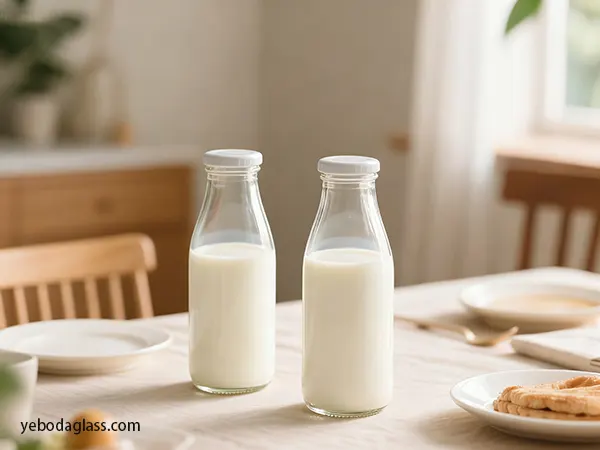
Comparative Summary
| Feature | Glass | PET | HDPE |
| Cost | High | Medium | Low |
| Barrier | Excellent | Good | Fair |
| Durability | Fragile | Shatter-resistant | High |
| Transparency | Excellent | Excellent | Opaque |
| Sustainability | High | Moderate | Moderate |
Glass bottles stand out in premium, reusable markets, while PET and HDPE suit cost-sensitive, high-volume operations.
Regulatory Compliance and Certification Standards for Milk Bottles Bulk
Key Food Safety Regulations
Bulk global purchasers of milk containers should take care that their purchases conform to various international standards for materials that come in contact with food.
- FDA (U.S.) 21 CFR Part 177: The law mandates that substances that come in contact with milk must be chemically nonreactive and safe for the body.
- EU Regulation (EC) 1935/2004: The foremost objective of this regulation is to guarantee that materials used for food-contact do not emit any harmful substances into food.
- GB4806 (China): Specifies requirements for the safety of food-contact materials in the case of both export and local production.
Those who supply glass milk bottles need to be very clear with their documentation to ensure traceability, which should include batch records and material safety data.
Certifications and Testing Protocols
Typically, a certified supplier may have the following certifications:
- ISO 9001: The system of quality management.
- ISO 22000 / HACCP: A food safety program.
- LFGB / REACH Compliance: For the European markets.
- BPA-Free and Heavy Metal Testing: To guarantee full consumer safety.
If a company is properly certified, it attracts trust and facilitates smooth global trade.
Traceability and Sustainability Labels
With sophisticated traceability solutions, buyers get the ability to identify the source, production date, and raw material of each batch of glass bottles. In addition to this, more and more customers are looking for sustainability labels such as the percentage of recycled material and energy used per unit.
Customization, Branding, and Closure System Integration
Where once packaging was merely a vessel, it has now transformed into a potent branding tool. When it comes to glass milk bottles bulk, the ability to customize is often what separates the winner from the loser.
Custom Design Capabilities
Through custom glass milk bottles brands have the opportunity to develop their own unique forms, surface qualities, and even the type of material. Besides, embossed logos, tailor-made color tinting or brand marks made by engraving not only give the product a visual but also a tactile recognition. Unique bottle shapes for small dairy brands are one way of building trust and at the same time luxurious glass bottles may be closed with metal or ceramic for a handcrafted finish.
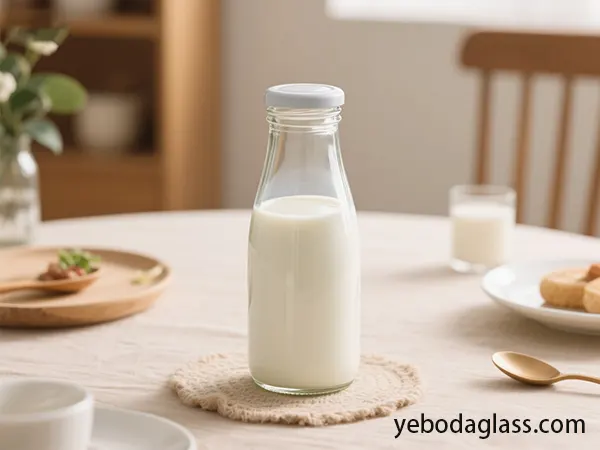
Labeling and Decoration Technologies
Some of the latest packaging methods are:
- Screen Printing: The method that delivers permanent and heat-resistant glass ink directly.
- Digital Printing: Allows the personalization of small batches.
- Shrink Sleeves: They provide a complete surface for the most attractive ad campaigns.
- Embossed Logos: Helping the consumer to recognize the brand through the use of the sense of touch.
By decorating milk bottles made of glass and taking advantage of the natural gloss, the product becomes more visible on the shelf and the customer’s perception is boosted.
Closure and Seal Integration
Besides protecting, closure systems show the user how to operate the product. Some of the alternatives are:
- Twist-Off Metal Caps to maintain the vintage look of milk.
- Flip-Top Lids,easy to use and reusable.
- Silicone Gaskets to ensure airtight seals in reusable glass milk bottles sold in bulk.
- Aesthetic harmony achieved through functional closures paired with creates packaging that looks like a unit and of high quality.
Strategic Sourcing and Supplier Vetting for Milk Bottles Bulk
Looking for Reliable Milk Bottles Bulk Partners
Locating a sustainable milk bottles bulk supplier is a matter of checking hygiene standards, gauging their ability to increase production, and dropping by to see their quality control operations. A corporate like Yeboda not only sells you bottles but also provides a complete service from designing, branding to shipping anywhere in the world.
Supplier Evaluation Framework
Before signing a company as your supplier, you should inspect:
- Manufacturing Capacity: Be certain that there are enough molds and that the production volume is high.
- Technical Competence: Make sure the procedures are accurate and the machines are monitored.
- Quality Assurance Systems: Observe whether the visual inspection is done automatically and that the samples are tested against impacts.
- Lead Time Reliability: Delivering on time is one of the most important things in B2B business.
The implementation of a comprehensive vetting process ensures consistent quality and compliance and reduces the risk of delays.
Negotiation and Long-Term Partnerships
Extending business dealings beyond single purchases opens the door to both parties’ creative ideas and growth. The gradual cooperation in future projects means newer designs of bottles, more eco-friendly material usage, and shared transportation efficiency.
Sustainability and Future Trends in Milk Bottles Bulk Packaging
The Shift Toward Circular Economy
The packaging industry is gradually shifting its focus to the reusability and recyclability of the packaging materials. In this respect, glass milk bottles bulk are just ideal as they can be cleaned and reused for several years with very little wear. Thus, numerous dairy brands are bringing back the milk-bottle-return programs as a way of lessening their carbon footprints.
Technological Advancements in Material Engineering
Much of the glass bottle manufacturing and the related cost and energy have been brought down by the use of lightweight tempered glass, better annealing, and recycled cullet content. The use of 3D models and AI-generated designs now ensures achieving the most durable yet material-efficient thickness in the bottle.
Market Trends and Consumer Behavior
Today, the majority of people take glass as a safe and sustainable material. Based on the most recent data, more than 60% of green buyers decide on glass milk bottles because they consider it clean and reusable. Those brands which dedicate themselves to circular packaging gain the upper hand and score higher on customer retention and loyalty.
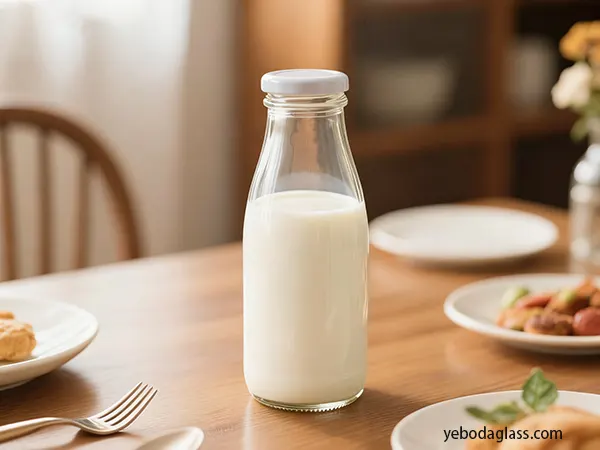
Conclusion
Making the decision to go with milk bottles bulk supplier that fits in with your overall strategy and not just your immediate stock-piling needs is a step towards sustainability, quality assurance, and brand building. Glass milk bottles are a perfect blend of the past, the present, and the future, providing not only environmental friendliness but also superior clarity and infinite recyclability. Such corporations that combine the elements of legal conformity, creative design, and long-term supplier relationships can gain an enduring competitive advantage both locally and globally. The packaging industry is undergoing a drastic change where brands that are capable of striking a balance between visual appeal, use of eco-friendly materials, and supply chain effectiveness will be the leaders of the next era of quality dairy and beverage packaging.

